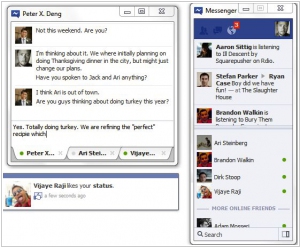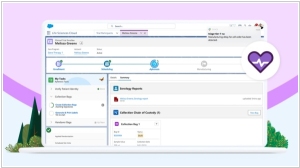Facebook Messenger vs Telegram
June 07, 2023 | Author: Adam Levine
17

Telegram is a messaging app with a focus on speed and security. It’s super-fast, simple, secure and free. Telegram seamlessly syncs across all of your devices and can be used on desktops, tablets and phones alike. You can send an unlimited amount of messages, photos, videos and files of any type (.doc, .zip, .pdf, etc.). Telegram groups have up to 200 people and you can send broadcasts to up to 100 contacts at a time. Be sure to check our website for a list of Telegram apps for all platforms.
Facebook Messenger and Telegram are two popular messaging platforms that offer distinct features and functionalities. Facebook Messenger, with its massive user base, provides seamless integration with the Facebook social network, allowing users to easily connect with friends and family. It offers a wide range of features such as voice and video calls, stickers, games, and a robust chatbot ecosystem. On the other hand, Telegram focuses on privacy and security, offering end-to-end encryption for secret chats and self-destructing messages. It also boasts features like large group chats, channels for broadcasting content, and a highly customizable interface. While Facebook Messenger excels in its social integration and feature-rich environment, Telegram stands out for its privacy-focused approach and flexibility in communication.
See also: Top 10 Business Messaging platforms
See also: Top 10 Business Messaging platforms
Facebook Messenger vs Telegram in our news:
2024. Messenger now lets you create shared albums, send HD photos and share larger files
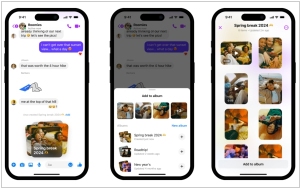
Meta is introducing new features for Messenger users, enabling the creation of shared albums within chats, the transmission of high-definition photos, and the sharing of larger files up to 100MB in size. This update caters to individuals accustomed to sharing albums or HD images via platforms like Google Drive. Previously, users were limited to viewing a list of photos shared in a chat without the ability to organize them; now, they can create albums in group chats, facilitating organization for various occasions such as vacations or family events. To initiate an album, users select multiple photos from the chat composer and tap "create album," or long-press a photo to do so. Additionally, users can add photos to existing albums by selecting the "Add to album" option. Everyone in a chat can view, add, delete, and download pictures and videos within an album, which can be accessed via the "Media" button in the chat interface. This introduction of shared albums fills a gap in Meta's messaging services, as it's not available on platforms like WhatsApp and Instagram DMs, likely making it a welcomed addition for users.
2024. Telegram launches Business accounts
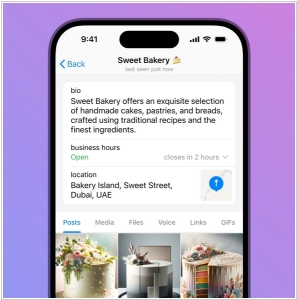
Telegram is gearing up to compete against Meta's WhatsApp and Messenger by unveiling a suite of new features tailored for businesses, alongside support for ad-revenue sharing. Launched recently following an initial announcement, Telegram Business introduces various options such as personalized start pages, the ability to establish business hours, preset replies, greetings, and automated away messages, as well as chatbots and chat tags. This move is expected to further bolster Telegram's Premium service, providing accessible tools and features for business users without the need for coding knowledge. Notably, businesses can now showcase their operating hours and location on a map, and initiate conversations with customers through customized start pages, offering text and sticker options. Similar to WhatsApp, Telegram Business also includes "quick replies" enabling users to access formatted preset messages containing links, media, stickers, and files.
2023. Facebook Messenger is finally adding default end-to-end encryption
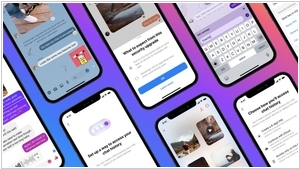
Facebook Messenger is enabling end-to-end encryption as the default setting for all personal messages and calls, marking a significant update along with various other improvements. This development is particularly noteworthy for individuals prioritizing online privacy. While Messenger initially introduced end-to-end encryption as an optional feature in 2016, users were required to actively opt in. After announcing tests for default end-to-end encryption in August, Meta, the parent company, is now poised to roll out this security feature for all users. This means that individual Messenger conversations will be completely private, shielded from unauthorized access, including by Meta itself. The encryption covers both text conversations and video calls, though group chats with more than two participants remain without this added protection, at least for the time being.
2022. Telegram is now offering a Premium subscription
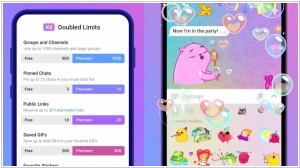
Telegram is introducing a Premium subscription to leverage its significant growth. Priced at $5 per month, Telegram Premium offers a range of additional features alongside the existing free functionalities. Subscribers can now enjoy the ability to upload larger files, with a size limit of up to 4GB, as well as accelerated file downloads. Furthermore, the subscription doubles various limits within the app, such as the ability to follow up to 1,000 channels, create 20 chat folders with 200 chats each, pin 10 chats, save 10 favorite stickers, and add a fourth account to the app. Premium users also gain access to exclusive stickers, including those with full-screen animations, unique reaction emojis, premium badges, and voice-to-text conversation capabilities.
2021. Facebook is bringing end-to-end encryption to Messenger calls
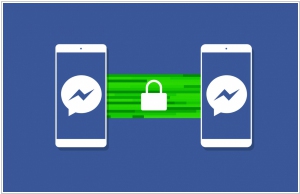
Facebook has expanded the availability of end-to-end encryption (E2EE) to include voice calls and video calls on Facebook Messenger. Since 2016, E2EE has been an option for securing text conversations on Facebook's primary messaging platform. Despite facing pressure from governmental entities to reconsider its plans for end-to-end encryption, Facebook is now extending this safeguard to encompass both voice and video calls made through Messenger. This implies that no one, including Facebook itself, can access or monitor the content of these communications. However, it's important to note that activating encryption is a voluntary action, meaning that without opting in to this new feature, your calls may still be susceptible to unauthorized data access.
2021. Telegram added group video chat and screen-sharing
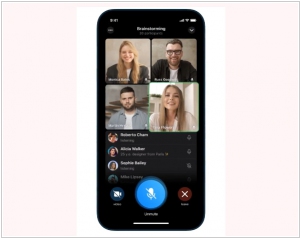
Telegram has introduced a new feature that allows users to engage in video chats with up to 30 people. This functionality is integrated into the Voice Chat feature of the app. When initiating a voice chat room, you will now notice a camera icon, which, when tapped, enables your video feed. Similar to other video conferencing applications like Zoom and Google Meet, Telegram allows you to expand the video to fullscreen and pin a specific participant to the center of the call. This ensures that the focus remains on the pinned individual even when others join the chat. Furthermore, Telegram now supports screen sharing. While on a video call, you have the flexibility to switch between your camera feed and the content displayed on your screen or even show both simultaneously.
2020. Facebook updates Messenger Rooms to take on Zoom
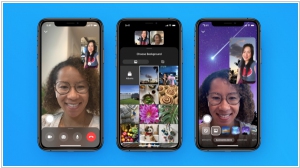
Messenger Rooms, Facebook's competitor to Zoom, is introducing new features to enhance the ease of creating and discovering Rooms, as well as personalizing the Rooms experience. The updated version of Messenger Rooms will prominently display the Rooms to which you've been invited at the top of your Chats tab in your inbox, making them easier to locate. Additionally, the option to create a new Room will be prominently placed in the Chats tab, ensuring its visibility. Various changes have been made to Rooms management as well. You can now create a Room with a default, suggested, or custom activity, set a future start date, and customize your audience selection. Furthermore, the Manage Rooms feature allows you to view, join, edit, or delete the Rooms you have created, as well as invite more people to join an existing Room.
2020. Facebook Messenger's new chat plugin for business websites allows to reach non-Facebook users
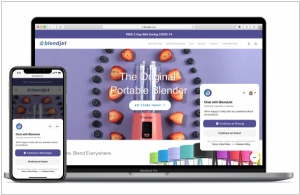
Facebook is simplifying the process for businesses to utilize its Messenger service on their respective websites. Previously, the customer chat plugin required visitors to the website to be logged into Facebook in order to engage in direct conversations with businesses. This requirement limited its adoption. However, with the updated plugin, Facebook is removing this limitation by allowing customers to interact with businesses even without being logged in. A new "continue as guest" option will be provided instead. From the business's perspective, they can continue to leverage all their existing tools to effectively manage conversations with these online users, irrespective of whether they are logged in or not.
2020. Businesses on Facebook can now respond to customers in Messenger
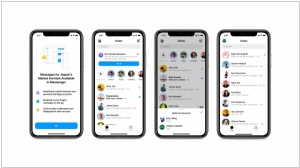
Facebook is introducing a new inbox feature on Messenger, enabling business owners to conveniently respond to customer messages using the same app they use for personal conversations with friends and family. This update streamlines communication for businesses, allowing them to handle all their interactions from a single app. No longer will they need to switch between multiple applications to compose and reply to customer inquiries, which many business owners found to be a frustrating process. However, if preferred, business users can still utilize Facebook's Page Manager app to manage their posts, create ads, access Page insights, and respond to messages.
2020. Facebook announces Zoom-like clone with Messenger Rooms
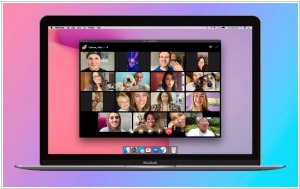
Facebook has introduced a new service called Messenger Rooms to rival Zoom. Messenger Rooms offers a tile-view video chat experience capable of accommodating up to 50 participants. Unlike Zoom, joining a Messenger Room does not require a Facebook account. Moreover, there are no time restrictions on calls made through Messenger Rooms. To ensure privacy, Messenger Rooms provides controls for users to manage who can access their rooms, including the ability to lock or unlock them. If a room is unlocked, anyone with the link can join and share it with others. However, the room creator must be present to initiate the call. With the recent security and privacy concerns surrounding Zoom, Messenger Rooms presents an alternative option for individuals seeking a different video conferencing solution.

